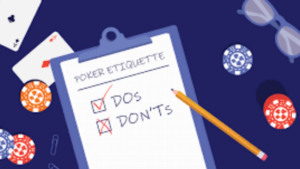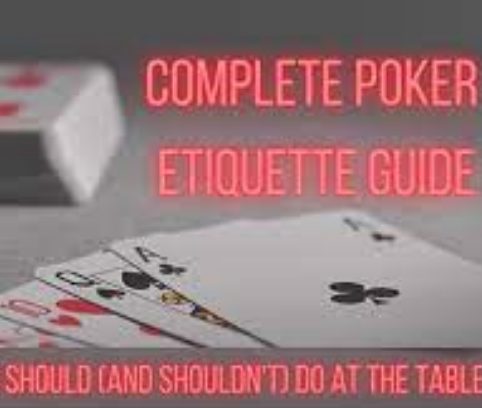Top poker etiquette rules come in different forms. Poker, more than just a game, is a social interaction that comes with its code of etiquette. Abiding by these unwritten laws is essential in maintaining a friendly atmosphere, respecting other players, and enhancing your overall gaming experience. Here are some of the top poker etiquette rules at online casinos that every player should know.
Understand The Basics:
Before sitting down at a poker table, familiarize yourself with the game’s basic rules. It’s not fair to others if the game has to be repeatedly paused because you don’t understand how it works. While most players are willing to help beginners, they also appreciate players who come prepared.
Respect The Dealer:
The dealer plays a crucial role in the game, ensuring everything runs smoothly. Treat them with respect, and remember not to criticize their dealing. If a mistake happens, point it out politely.
Don’t Slow Play:
Poker is not a game to be rushed, but taking excessive time for every decision can be frustrating for other players. This slow play, also known as ‘tanking,’ can disrupt the game’s flow and cause unnecessary delays.
Pay Attention:
Keep up with the game and be ready when your turn comes. It’s frustrating for others if they have to remind you every time it’s your turn. Also, refrain from using your phone or other distractions during the game.
Be Clear About Your Intentions:
Clarity is crucial in poker. When it’s your turn, state your action clearly – whether you’re calling, raising, or folding. This helps avoid misunderstandings and keeps the game moving.

Top Poker Etiquette Rules
Don’t Discuss a Hand in Play:
This rule is fundamental. Discussing a hand while it’s still in play can influence the game and is considered extremely unsporting and disrespectful to other players.
No Splashing the Pot:
When making a bet, place your chips neatly in front of you. Tossing them haphazardly into the pot (‘splashing the pot’) creates confusion and makes it tough for both the dealer and players to ascertain how much you’ve bet.
Respect the ‘One Player Per Hand’ Rule:
Getting advice from others while you’re in the middle of a hand is considered poor etiquette. Your decisions should be your own – it’s part of the game’s challenge.
Display Good Sportsmanship:
Whether you’re on a winning streak or the cards aren’t in your favor, remember to maintain your composure. Celebrating excessively or showing frustration can create a negative environment. Remember, poker is a game of ups and downs.
Be Respectful:
Lastly, and most importantly, respect your fellow players. Avoid criticizing their play, using offensive language, or any other behavior that could make others uncomfortable. Poker is a social game, and maintaining a friendly, respectful atmosphere enriches the experience for everyone.
Why its important to follow etiquette rules when playing poker
Poker, like any game or sport, comes with its own set of unwritten rules or etiquette that should be adhered to out of respect for other players, the dealer, and the game itself. Observing poker etiquette is vital to preserving the integrity, fairness, and enjoyment of the game.
Firstly, it ensures a peaceful and friendly playing atmosphere. Respecting others’ turns, not reacting excessively to wins or losses, and refraining from giving unsolicited advice helps keep the game enjoyable for everyone.
Secondly, it safeguards the poker table from conflicts. Disrespecting etiquette can lead to misunderstandings or disputes which can disrupt the game.
Maintaining a composed demeanor also falls under poker etiquette. This is not only respectful, but it also maintains the strategic aspect of the game. Expressing too much emotion can give away your strategies to keen observers at the table.
Lastly, poker etiquette promotes fairness. Rules such as not discussing a hand while it’s in progress, keeping your cards visible, and promptly making your actions clear help ensure that everyone has an equal chance at winning.
Conclusion:
Poker etiquette goes beyond these ten rules, extending to all aspects of interaction around the table. Remember, the essence of poker etiquette is respect – for the game, the dealer, and, most importantly, your fellow players.

